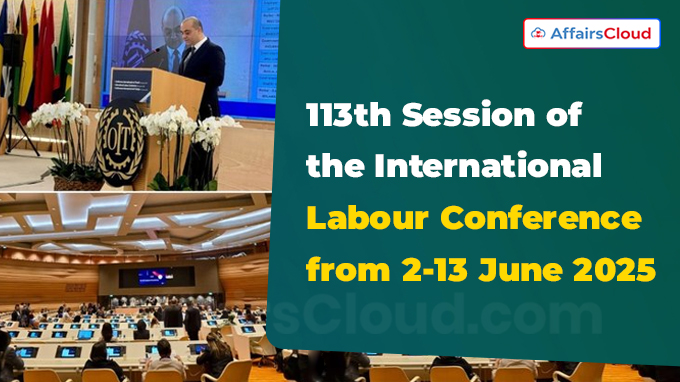 The 113th session of the International Labour Conference (ILC) or Parliament of Labour, the highest decision-making body of the International Labour Organization (ILO), was held from 2nd to 13th June 2025 in Geneva, Switzerland. The annual conference brought together tripartite delegations from all 187 ILO member countries, comprising representatives from governments, employers, and workers.
The 113th session of the International Labour Conference (ILC) or Parliament of Labour, the highest decision-making body of the International Labour Organization (ILO), was held from 2nd to 13th June 2025 in Geneva, Switzerland. The annual conference brought together tripartite delegations from all 187 ILO member countries, comprising representatives from governments, employers, and workers.
- The conference aimed to create global labour standards, review member countries’ labour policies, and address key issues like workers’ rights, social security, and workplace biological hazards.
- The ILC 2025 concluded with the historic adoption of the first international labour standards focused on preventing workplace exposure to biological hazards.
Highlights of 113th International Labour Conference (ILC):
At the 113th ILC, several key resolutions and decisions were adopted:
Transition to Formal Work:
i.The ILC adopted a resolution aimed at reducing informality and promoting the transition to formal employment across member states.
ii.Maritime Labour Convention (MLC, 2006) Amendments: With overwhelming support, the ILC approved seven amendments to the MLC, 2006. These include provisions to:
- Address violence and harassment on board ships,
- Strengthen rights to shore leave and repatriation, and
- Formally recognize seafarers as key workers.
iii.Myanmar Resolution: A resolution was passed urging Myanmar’s military authorities to implement the recommendations of the ILO Commission of Inquiry.
iv.Palestine’s Observer Status: The ILC resolved to invite Palestine to participate in ILO meetings as a non-member observer State, shifting from its earlier designation as a liberation movement.
v.Programme and Budget 2026–27: The conference also adopted the resolution outlining the ILO’s Programme and Budget for 2026–27, including budgetary allocations among Member States.
Note: The second edition of the Global Coalition for Social Justice annual forum took place on 12 June, on the sidelines of the ILC. The forum reaffirmed the Coalition’s commitment to driving real change and improving lives through concrete action.
India’s Participation at the 113th ILC:
i.India was represented by Union Minister Dr. Mansukh Mandaviya, Ministry of Labour and Employment (MoL&E). He highlighted India’s progress in employment generation, social security expansion, and labour reforms.
ii.K. P. Mahadevaswamy, Chairman and Managing Director (CMD) of New Delhi (Delhi) based National Buildings Construction Corporation (NBCC) under the Ministry of Housing and Urban Affairs (MoHUA), represented the Indian employers’ delegation.
Key Indian Highlights at the Conference:
i.Unemployment Reduction: Fell from 6% (2017) to 3.2% (2024), creating 7.5 crore formal jobs in seven years
ii.Employment-Linked Incentive (ELI) Scheme: Allocated USD 12.81 billion (approximately Rs. 1.06 lakh crore) to boost formal job creation.
iii.Social security coverage: Expanded from 19% (2015) to 64.3% (2025), benefiting 940 million people.
- India became the first country to update its 2025 social security coverage data in the ILOSTAT database of the ILO.
iv.Gig and Platform Workers: The number of gig and platform workers is projected to reach 23.5 million by 2030.
- They are included in India’s Code on Social Security 2020, which recognises them as a distinct category eligible for benefits.
v.e-Shram Portal: National database linking 300 million unorganised workers (including gig/platform workers) to social security schemes.
vi.National Career Service (NCS) Portal: Enhanced to connect Indian workers with global opportunities
vii.Job Creation Schemes: Mahatma Gandhi National Rural Employment Guarantee Act (MGNREGA), Production-Linked Incentive (PLI), and ELI driving inclusive growth.
UN Adopts Biological Hazards Convention:
The Biological Hazards in the Working Environment Convention (C192) was adopted by the ILO, with 406 votes in favour, 12 against, and 13 abstentions.
i.The Convention defines biological hazards ,from viruses and bacteria to toxins, in workplace settings and applies to all branches of economic activity.
ii.It mandates member states to develop national policies focused on the prevention, protection, and preparedness against biological risks, with specific measures for high-risk sectors.
iii.Employers are required to establish emergency management procedures, work collaboratively with employees on preventive measures, and provide training and awareness on biological hazards.
About International Labour Organisation (ILO):
Director-General (DG) – Gilbert F. Houngbo (Togo)
Headquarters – Geneva, Switzerland
Member nations – 187
Established – 1919




